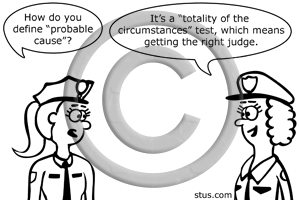Illinois v. Gates
The Bloomingdale, Illinois Police Department received an anonymous tip accusing Lance and Susan Gates of drug trafficking. The letter stated that Susan and Lance Gates obtained drugs in Florida which they later sold in Illinois. The tip also alleged that Gates had over a hundred thousand dollars worth of drugs in their basement, and that other drug dealers regularly frequented the Gates’ home.
After receiving the tip, the police department opened an investigation into the accusations and found that Lance Gates had purchased a plane ticket from Chicago to Florida. Surveillance from the DEA corroborated that Lance Gates and another woman had left Florida in a car driving towards Illinois.
Based on the evidence obtained by the Bloomingdale Police Department, DEA, and the anonymous letter, a magistrate judge issued a warrant allowing the police to search the Gates’ car and residence. The search revealed over 350 pounds of marijuana, and several weapons.
The Illinois Circuit Court and Supreme Court of Illinois both held that the magistrate did not have probable cause to issue a search warrant. All investigation into Lance and Susan Gates was based on the initial anonymous tip that lacked any information about informant’s sources or credibility. Since the warrant was issued without probable cause, the evidence found during the search of the Gates’ car and basement was excluded from the trial. This lower court decision upheld the Supreme Court’s Aguilar-Spinelli two-pronged test to determine whether a search warrant based on an anonymous tip was valid.
The Supreme Court reversed the lower court ruling in Illinois v. Gates with a 6-3 decision written by Justice Rehnquist. The majority opinion replaced the Aguilar-Spinelli test with a rule that expands magistrate discretion to determine the reliability of anonymous information based on the “totality of the circumstances.” Justice Rehnquist argued that the Aguilar-Spinelli test reduced the ability of the magistrate judge to determine probable cause using their practical and common sense decision-making. The majority held that easier and flexible “totality of the circumstances” standard would better serve public and private interests.

The dissent argued that the two-pronged test in Aguilar-Spinelli was crucial to protect citizen’s rights in the police-dominated investigation process. The new “totality of the circumstances” test would enable law enforcers to prosecute suspects with little evidence and potentially without probable cause. Furthermore, the dissent argued that the majority did not show that the Aguilar–Spinelli test was burdened by “overly technical rules governing searches and seizures.”
The warrant process is intended as a check on police power. With this ruling, the magistrate has broadened authority to provide warrants based on unsubstantiated anonymous tips. I believe that this decision has the potential to increase collusion between the magistrate and the police force to unfairly prosecute suspects. The elimination of the Aguilar-Spinelli test effectively reduces Fourth Amendment protection against unreasonable searches and seizures.